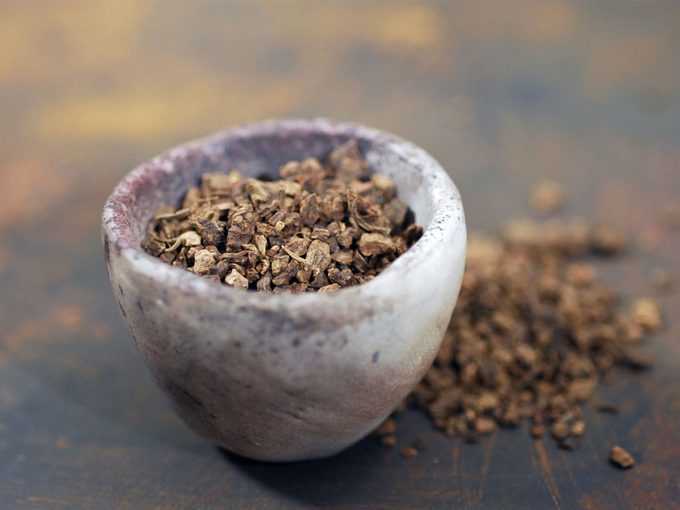Valerian Root: What to Know About this Herbal Sleep Aid
‘Sleeping it off’ is difficult if insomnia is your problem. Fortunately, there’s an herbal sleep aid that also helps ease anxiety. Celebrated for its sedative properties, valerian root may give you the rest and relief you need

Source: The Amazing Healing Powers of Nature, Reader’s Digest
Suffering from anxiety or insomnia? Give yourself a rest by giving valerian root a try
Valerian (Valeriana officinalis) is a natural remedy used to treat anxiety and insomnia. The ancient Greeks called valerian root ‘Phu’ (as in phew!) because it smells like nothing other than a stinky old sock. But this substance may be a boon if you’re stressed or unable to sleep. As more and more people commit to healthy living, more and more people are choosing to put the sleeping pills aside and try a herbal remedy first. If you’ve been finding yourself on edge or are having sleep trouble, valerian root is a safe home remedy.
Valerian root’s distinctive aroma comes from isovaleric acid, one of several calming compounds it contains. Traditional use of the plant for insomnia and anxiety dates back thousands of years, to Greece, Rome and China. It became popular in Europe in the 1600s and until the 1940s was even listed in the US National Formulary as a sleep aid and anxiety remedy. Today, valerian is enjoying a resurgence in popularity, as researchers document its sedative properties.
How to take valerian to help you sleep
If you’d like to try valerian to ease mild insomnia, take 400 to 900 milligrams of valerian extract in tablet or capsule form or 20 to 60 drops of valerian tincture in warm water between half an hour and 2 hours before bedtime.
Valerian tea may also help: mix 2 to 3 grams of dried, powdered valerian steeped in a cup (225 millilitres) of just-boiled water. Mask the unpleasant taste by also steeping a cinnamon stick or star anise in the cup. Extracts containing lemon balm as well as valerian’which a study showed to be effective against anxiety’are also available; follow label directions.
Modern research and studies on valerian
Nightly tablets of valerian root extract helped about 1 in 13 insomniacs enjoy a longer night’s sleep, with fewer middle-of-the night wake-ups, in a 2007 study conducted by the Norwegian Knowledge Centre for the Health Services. The researchers concluded: ‘A small number of people with insomnia are likely to experience a noticeable improvement attributable to valerian.’
Valerian’s reputation for easing agitation has also been put to the test in a number of studies, with mixed results. In laboratory experiments, it appears to relax mice, rats and even zebrafish. And in 2008, University of Zurich scientists discovered that valerian compounds enhanced the effects of GABA, a brain chemical that eases fear and anxiety by calming excited brain cells. Yet valerian didn’t soothe anxiety in women volunteers during a 2007 study held at the University of Illinois; and in a 2006 review of studies of the use of valerian to treat anxiety in people, researchers from Brazil’s Federal University of São Paulo concluded that there’s not yet enough evidence to prove that this herb is effective. Combining valerian with lemon balm (Melissa officinalis), another calming herb, did, however, ease stress in one 2006 study at the University of Northumbria in England.




